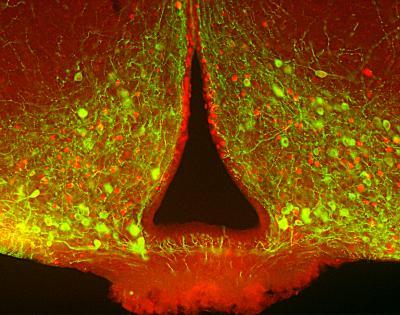全球范围内肥胖以惊人的速度地增长,暴饮暴食是最大的病因。在控制饥饿和饱腹感的大脑回路中,研究人员发现了一种分子机制处于诱导食欲上升的中心位置,该分子机制关联到与衰老和组织损伤有关的自由基。

黑素神经元未激活的是绿色,激活的是红色
论文发表在8月28日的《Nature Medicine》网络版中。研究发现,下丘脑中自由基水平的升高会直接或间接地抑制肥胖鼠的食欲,这一过程借助了促饱腹感的黑素神经元的激活。
研究人员称,自由基是一把双刃剑,一方面,我们必须利用这些关键的信号分子停止饮食;另一方面,长期接触这类分子时,细胞会受到损害,进而引起衰老。
为应对持续的暴饮暴食,机体可履行自由基合成抑制的细胞机制。胞内过氧化物酶体行使对自由基合成的抑制功能,这一功能使得细胞免受自由基的损害。
老鼠进食后,负责饮食停止的神经元具有高水平的自由基。这一过程由瘦素和血糖驱动,它们向大脑传递控制食物摄取的信号。瘦素、血糖以及自由基都会随老鼠的进食而升高,但对饮食诱导的肥胖鼠而言,同一神经元却出现上述分子的浓度没有上升,此外,自由基水平受到过氧化物酶体的消减,这类神经元的激活被抑制,因此,即便进食,还是存在饥饿感。(生物探索译 Pobee)
生物探索推荐英文原文
Free Radicals Crucial to Suppressing Appetite
Obesity is growing at alarming rates worldwide, and the biggest culprit is overeating. In a study of brain circuits that control hunger and satiety, Yale School of Medicine researchers have found that molecular mechanisms controlling free radicals -- molecules tied to aging and tissue damage -- are at the heart of increased appetite in diet-induced obesity.
Published Aug. 28 in the advanced online issue of Nature Medicine, the study found that elevating free radical levels in the hypothalamus directly or indirectly suppresses appetite in obese mice by activating satiety-promoting melanocortin neurons. Free radicals, however, are also thought to drive the aging process.
"It's a catch-22," said senior author Tamas Horvath, the Jean and David W. Wallace Professor of Biomedical Research, chair of comparative medicine and director of the Yale Program on Integrative Cell Signaling and Neurobiology of Metabolism. "On one hand, you must have these critical signaling molecules to stop eating. On the other hand, if exposed to them chronically, free radicals damage cells and promote aging."
"That's why, in response to continuous overeating, a cellular mechanism kicks in to suppress the generation of these free radicals," added lead author Sabrina Diano, associate professor of Ob/Gyn, neurobiology and comparative medicine. "While this free radical-suppressing mechanism -- promoted by growth of intracellular organelles, called peroxisomes -- protects the cells from damage, this same process will decrease the ability to feel full after eating."
After the mice ate, the team saw that the neurons responsible for stopping overeating had high levels of free radicals. This process is driven by the hormone leptin and glucose, which signal the brain to modulate food intake. When mice eat, leptin and glucose levels go up, as does free radical levels. However, in mice with diet-induced obesity, these same neurons display impaired firing and activity (leptin resistance); in these mice, levels of free radicals were buffered by peroxisomes, preventing the activation of these neurons and thus the ability to feel sated after eating.
According to Horvath and Diano, the crucial role of free radicals in promoting satiety as well as degenerative processes associated with aging may explain why it has been difficult to develop successful therapeutic strategies for obesity without major side effects. Current studies address the question of whether, under any circumstance, satiety could be promoted without sustained elevation of free radicals in the brain and periphery.
The study was supported by grants form the National Institutes of Health and the American Diabetes Association.







